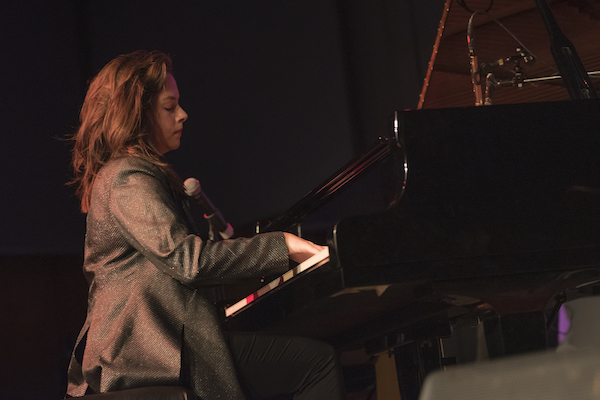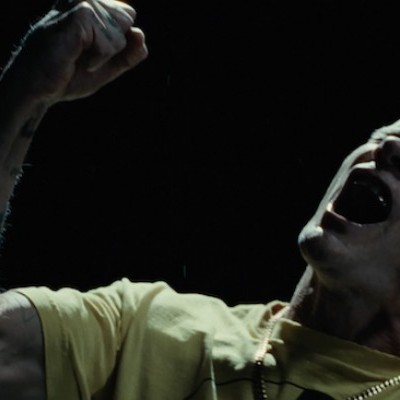Dec 9, 2025 12:28 PM
In Memoriam: Gordon Goodwin, 1954–2025
Gordon Goodwin, an award-winning saxophonist, pianist, bandleader, composer and arranger, died Dec. 8 in Los Angeles.…

Kasia Pietrzko performs during the Jazz Forum Showcase in Szczecin, Poland, which ran Oct. 1–3.
(Photo: Kasia Stanczyk)On Oct. 1 at Radio Szczecin, where the eight participating bands in Jazz Forum Showcase Powered by Szczecin Jazz performed marathon concerts on consecutive evenings, 25-year-old pianist Kasia Pietrzko made a strong impression. During her 45-minute set, Pietrzko’s working trio—bassist Andrzej Święs and drummer Piotr Budniak—animated the leader’s harmonically sophisticated, metrically varied pieces, supporting and detailing melodic improvisations that seemed to emanate from voices deep within her.
A native of Bielsko-Biała in southwest Poland, about 75 miles kilometers from Krakow, where she attends conservatory (her Ph.D. thesis is titled Sergei Prokofiev: Inspiration for the Modern Jazz Pianist), Pietrzko focused on the Euro-canon from 6 to 19.
“It was great exercise for my fingers but it wasn’t enough,” Pietrzko said. She converted to jazz after witnessing a set by the iconic Polish trumpeter Tomasz Stańko at jazz festival Bielska Zadymka Jazzowa. Three years later at the same festival, she played with bassist Corcoran Holt, on site for a set with Kenny Garrett. He urged her to come to New York. She followed that suggestion, spending a transformative three-week sojourn that included several lessons with Aaron Parks.
A day after the Radio Szczecin concert, Pietrzko spoke with DownBeat about her musical journey during the six ensuing years.
The following has been edited for length and clarity.
How did your lessons with Parks impact the way you think about music?
During my first lesson with Aaron, he closed my eyes and placed his hands on my shoulders, and he said, “Kasia, feel your body and speak to your body, and listen to what your body is saying to you.”
After those lessons, I felt that I see colors in music, and that I can compose my music from what I see and exactly what I feel. I decided to play fewer notes. I know sometimes I play a lot of notes, but it’s because of the emotions.
When I returned to Poland, I was a completely different person. I’d been scared about the jazz world, but now I felt that this is my world and I will take a risk and try to make something mine. My soul was ready for that. But I was playing too much, and when I was 20 I had a depression about this; for half a year I couldn’t play anything. But then when I was 21, I came to New York a second time, and it got better. I started to see the baddest cats, and this music was good, but not enough for me. Then I thought, “Wow, I’m not so bad as I thought. I’m doing OK.”
The first jazz concert you heard was by Tomasz Stańko, and I gather that you played on his very last gig.
When I first heard him, I really didn’t know what his music was, but after a few years I started to understand it and wanted to experiment more with it. Then two years ago, I gave Tomasz my CD after he played a concert in Bielsko. A friend had told me he didn’t take CDs, but I decided to try.
I said, “Hello, Tomasz, it was a great concert. I know that you are not going to take this CD to your home, but this CD is for you.” The next day, on Sunday, at 3p.m., after lunch with my parents, the phone rang. “Miss Kasia Pietrzko?” I said, “Yes.” I thought this is the grandfather of some nice small kid who wants a lesson with me, which sometimes I have to do for money. “My name is Tomasz Stańko.” He said he liked my CD, and asked me to attend a concert he was doing in Krakow; he said we might have to rehearse.
I came, I took scores from him, and after three months his daughter called and said we’d do a concert together on Valentine’s Day. We scheduled a big European tour, but then he passed away. After that, I couldn’t compose anything for a year.
Why was Stańko so important to you—and to Polish jazz?
Because he was going only his own way. His music is so lyrical. He mixes free-jazz with beautiful themes, beautiful melodies, beautiful harmony. This mix always inspired me, and it happened with every band that played with him.
Is there such a thing as Polish jazz, a Polish identity projected through music?
Maybe just a little bit Romantic. This is what Stańko has—really melancholic. I think all the Polish musicians have this melancholic thing, and now they can explore and mix together classical music and jazz.
For a long time, I stopped listening to Polish music because I didn’t want to compose like them. I’ve started again since I know I should—and I always try to listen to music in different realms. For now, I’m coming back to Keith Jarrett, and I’m listening to Prokofiev, Rachmaninoff, Gustav Mahler. I’m returning to classical music because I miss this precision. It really inspires me, that you know exactly what you are going to play. When I’m playing, I don’t exactly know what I will play. I am just listening to my body.
I’m also listening to Brad Mehldau’s new album, Finding Gabriel. When I’m driving and I’m sleepy, I put it on and it’s like, “Oh, I can drive three hours.”
I was listening to Brad Mehldau for a long time, and then I realized that I was starting to use his licks, and thought, “No, I don’t want to play like Brad Mehldau.” And for five years, I was listening to Aaron Parks’ Invisible Cinema. I don’t know why, but that album makes me feel so comfortable. I think about a lesson with him, when I was so young and not so mature. I said, “Aaron, I would like to play like you.” He said, “Kasia, you won’t play like me. But I won’t play like you.” This is the most incredible thing in music. DB

Goodwin was one of the most acclaimed, successful and influential jazz musicians of his generation.
Dec 9, 2025 12:28 PM
Gordon Goodwin, an award-winning saxophonist, pianist, bandleader, composer and arranger, died Dec. 8 in Los Angeles.…

Belá Fleck during an interview with Fredrika Whitfield on CNN.
Jan 13, 2026 2:09 PM
The fallout from the renaming of the John F. Kennedy Center for the Performing Arts to include President Donald…

The success of Oregon’s first album, 1971’s Music Of Another Present Era, allowed Towner to establish a solo career.
Jan 19, 2026 5:02 PM
Ralph Towner, a guitarist and composer who blended multiple genres, including jazz — and throughout them all remained…

Flea has returned to his first instrument — the trumpet — and assembled a dream band of jazz musicians to record a new album.
Dec 2, 2025 2:01 AM
After a nearly five-decade career as one of his generation’s defining rock bassists, Flea has returned to his first…

Rico’s Anti-Microbial Instrument Swab
Jan 19, 2026 2:48 PM
With this year’s NAMM Show right around the corner, we can look forward to plenty of new and innovative instruments…